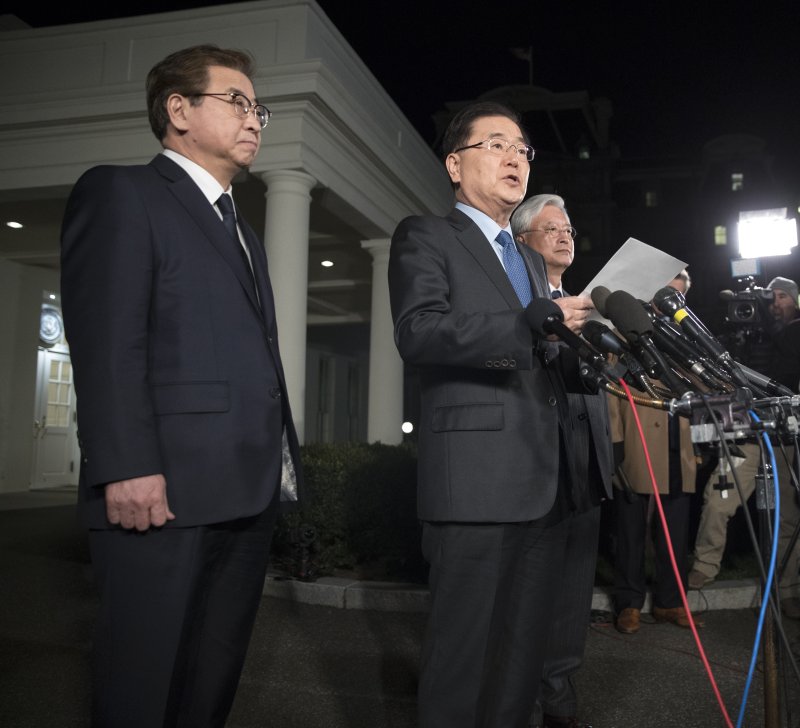
South Korean National Security Director Chung Eui-yong makes a
statement regarding his March 7 meeting with North Korean leader Kim
Jong Un as National Intelligence Service chief Suh Hoon (L) looks on at
the entrance to the White House on Thursday. Photo by Michael
Reynolds/EPA-EFE
The news that President Donald Trump would meet with North Korea's Kim Jong Un
in May struck like a veritable thunderbolt on an otherwise unsuspecting
day. Immediately, the administration's taunting and threatening of Kim
were credited with precipitating this seeming diplomatic triumph. "Fire
and fury" and "Little Rocket Man" may have persuaded the other side to
come to the table. Or perhaps neither was relevant.
Of course, any possible opportunity must be seized. It is easy to
criticize the peevishly short time window -- how long did it take Henry Kissinger's secret diplomacy before Richard Nixon
went to China -- and seeming absence of America Korean experts to
ensure that any meeting was well prepared in advance. Hence, hope may be
the operative word.
Why the president acted so quickly after the visit of South Korea's
national security adviser to the White House to announce this stunning
development directly to the press room may be as interesting as what
follows. Given the president's long and often fraught history in real
estate when last-second "hail Marys" were all that stood between
disaster and survival, perhaps those experiences were at play. The week
could not have been much worse.
The seedy Stormy Daniels
affair sprouted new wings with the inadvertent announcement by the
White House press secretary that the president had won an arbitration
case against the actress. The tariffs imposed on steel and aluminum
provoked angry responses within the Republican Party and with some of
our closest allies, namely Japan who would be affected. Any history
student will know that tariffs do not work.
Presented the opportunity for something as dramatic as a meeting with
Kim, it should be no surprise that Trump leapt at it for many reasons,
especially given his preference for disruption. This was pure Trump --
-no warning or seeming coordination with his Cabinet -- Secretary of
State Rex Tillerson
was caught unaware -- and a reality show-like run-out. A further
benefit was that the bombshell Korean meeting drained the oxygen from
these other media firestorms. As in past real estate deals, for the
moment, the president granted himself a temporary respite.
How might this play out? First, for many reasons, no meeting may take
place or be deferred. Second, the meeting could simply be a first step
in a much longer negotiation process agreed to by the two leaders.
Third, a breakthrough could be achieved namely, moving toward a peace
treaty that finally puts an end to the Korean War armistice that has
been in place since July 1953 or steps to de-militarize the peninsula.
One outcome does seem improbable if not impossible -- North Korea giving
up its nuclear weapons.
Pyongyang consented to a meeting with the American president
following rather clever Olympics diplomacy by South Korea inviting North
Korean participation. North Korea has always wanted meetings with
sitting presidents -- Jimmy Carter and Bill Clinton
visited after leaving office. Some will argue that sanctions and
Chinese pressure, along with strong American rhetoric, were the forcing
functions.
Those with better understanding of the Korean culture and the Kim
family mindset would argue that now that North Korea believes it has
achieved or soon will the capability to threaten the United States with
nuclear intercontinental weapons, it has gained some degree of parity
and confidence vis a vis Washington and will be negotiating from a
position of strength. At this point, what other incentives South Korea
or China may have offered Kim have not been made public if any were.
Unfortunately, with no ambassador in Seoul and the resignation of the
lead American negotiator, it is worrisome that Washington may not have
sufficient experience to ensure that talks will produce some positive
results.
A meeting that leads nowhere or ends badly will be worse than having
no meeting at all. Trump probably feels that his negotiating skills will
impress and even overwhelm a relatively immature and youthful
protagonist. But arrogance and ego, both of which the president
possesses in abundance, can be fatal.
Franklin Roosevelt honestly believed that by force of his personality Joseph Stalin
would be sufficiently charmed to accept America's views at Yalta. FDR
could not have been more wrong. Because too often Kim has been described
as irrational and his physical appearance demeaned, he can be
underestimated. That too would be a very bad error. Finally, before
leaving for this visit if it does indeed take place, the president
should be briefed at length on North Korean negotiating styles and
history going all the way back to the talks at Panmunjom that ultimately
led to a truce in 1953.
We do not want this president to repeat the errors of FDR with Stalin this time around.
Harlan Ullman
served as senior adviser for Supreme Allied Commander Europe for 12
years, is senior adviser at Washington D.C.'s Atlantic Council and
chairman of two private companies. His newest book is "Anatomy of
Failure: Why America Has Lost Every War It Starts." Follow him on
Twitter @harlankullman.
When News Breaks Out, We Break In. (The 2014 Bloggies Finalist)
No comments:
Post a Comment
Note: Only a member of this blog may post a comment.